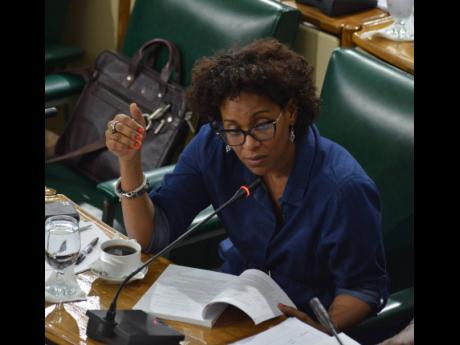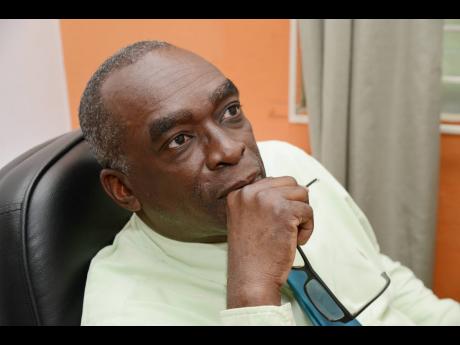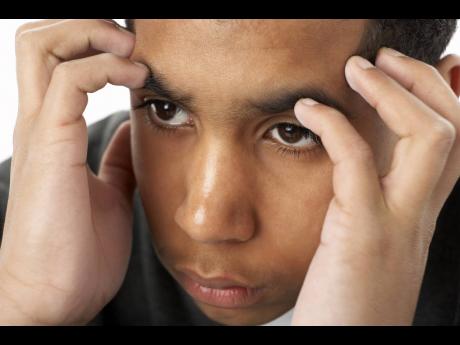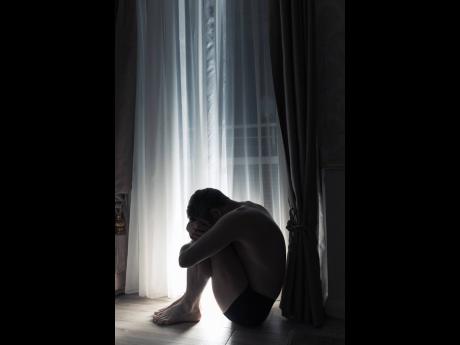Mental health epidemic warning
Treatment options curtailed as pandemic cramps services
A silent surge in mental health disorders triggered by the COVID-19 pandemic has placed Jamaica on the verge of a crisis that could have devastating long-term implications, medical experts have warned.
There are fears, too, that amid the escalating number of mental health-related cases being reported, persons who display “violent behaviour towards themselves and others” are being “stabilised” and returned to their communities.
Insiders who spoke to The Sunday Gleaner blamed this on insufficient resources dedicated to mental health management in the public healthcare system, particularly the community mental health service, and severe dislocations caused by the COVID-19 outbreak.
“Right now, what is happening at UHWI (University Hospital of the West Indies) emergency room is that persons who are actively psychotic, violent and aggressive, … there are no bed spaces to house them,” one insider revealed.
“So, we have to be trying to somewhat stabilise them and then send them back into the community, persons who we know are high-risk for violence, but we don’t have any space,” the inside added.
One year after Jamaica’s first confirmed COVID case, psychologists and psychiatrists reported they are seeing an increase in persons contemplating suicide, cases of depression, anxiety and panic disorders, schizophrenia, bipolar disorders and a scattering of “specific or COVID-19 phobia” across the island.
And they say doctors, nurses, members of the security forces and other first responders as well as students, the elderly and women who headed households are among the cohort hardest hit.
“My concern as it relate to mental health in Jamaica right now is that we will be dealing with an epidemic of mental health issues,” warned Dr Saphire Longmore, president of the Jamaica Psychiatric Association (JPA).
The Ministry of Health and Wellness (MOHW) disclosed that its mental health/suicide prevention hotline fielded a total of 753 calls between October 2019, when it began operations, and the end of October last year.
The 138 calls recorded last October marked the highest number recorded in a single month, followed by the 94 calls fielded in last September. Females accounted for 70 and 74 per cent, respectively, of those calls.
Noting that the lowest number of calls was received between September and December 2019, the health ministry acknowledged that there was a “further uptick” after March 10 last year when Jamaica confirmed its first COVID case.
“This was reflected in a more than 100 per cent increase in calls [moving] from 37 in March 2020 to 89 in April 2020. That increase is likely due to several factors which may be directly and indirectly related to COVID-19,” the ministry said.
It acknowledged, too, that COVID-related calls included complaints of depression, feelings of anxiety, frustration with waiting for test results, isolation and fear while other calls related to “general mental health crises”.
The figures from the health ministry are consistent with reports by the JPA and the Jamaican Psychologists Society (JamPsych) that their members have indicated that they are treating an increasing number of persons with mental disorders.
“In addition to the depression and anxiety that has increased, for people who had pre-existing conditions or issues they did know of, the pandemic has kinda heightened those,” said Christina Silvera, director of membership at JamPsych.
A study conducted last August by Professor Wendel Abel and a team at the University of the West Indies (UWI) found that 55 per cent of respondents admitted to depression and anxiety, while 97 per cent indicated that they needed psychosocial support or “an opportunity to ventilate”.
“I have never had to treat as many persons with depression in my 40 years of working. People will tell you it’s the stress related to the pandemic,” said the respected psychiatrist.
Another psychiatrist employed in the public health system reported seeing an increase in persons who want to end their lives.
“Normally when I am on call, I would field, on average, maybe two or three calls around suicide over a two or three-month period, like serious suicide,” revealed one psychiatrist, who works as a consultant at the UHWI.
“Since COVID when I am on call, I am fielding up to seven for the week that I am on call. So, before I was getting on average two per week, but it has not gone up to seven per week.”
Weak support system in communities, says insider
A 13-year-old girl who recently enrolled at the Edith Dalton James High School is believed to have taken her own life last Wednesday inside her family’s Spanish Town, St Catherine, home dressed in full school uniform.
Orlando Worges, principal of the St Andrew-based school, confirmed reports that the family of the teen was finding it difficult to enable her to attend online classes.
“I checked the system just now and it showed that December was the last time she attended classes online,” he disclosed.
“We contacted her via WhatsApp in January and she said that her device was lost,” Worges recounted.
Longmore believes students and young adults are among the cohort worst affected by the COVID pandemic.
“The teenage and young adult years are a time of exploration and self-discovery in all areas … sexuality, career and social grouping,” she reasoned.
“This COVID crisis has hit on that age group significantly because it affects their education,” she said, pointing to the shutdown of the majority of in-person classes in the education system and the curtailment of recreational activities caused by the necessary COVID containment measures.
But amid increased need for mental health intervention, insiders pointed to a range of glaring lapses in the public healthcare system.
As an example, one insider revealed that “not one psychologist” has been employed by the health ministry to assist with the delivery of mental care at public health facilities across the entire Kingston and St Andrew region.
“I am not even sure if they have ever had one. So, for example, clinics that operate out of the Comprehensive Health Centre [in downtown Kingston] or Maxfield Park Health Centre [in St Andrew], not one psychologist.”
Health and Wellness Minister Dr Christopher Tufton indicated yesterday that he would “check” on the assertion and provide a response. There was no update up to press time.
Another insider reported, too, that there is only one community mental health team serving the parishes of Manchester, St Elizabeth and Clarendon.
“That’s crazy.”
A community mental health team typically includes a psychiatrist, a psychologist, a social worker as well as a psychiatric nurse and a psychiatric aide.
“So now the mental health officer and the psychiatric aides are primarily the ones who go out in a mobile unit into the communities to persons who need their medication and treatment and are either reluctant or unable to get to the clinics,” the insider lamented.
Tufton disclosed that as part of its efforts to address the increased reports of mental health illnesses, the ministry has launched an initiative called ‘Reachout Rangers’, which sees teams of volunteers “going out into the communities and visiting particularly the elderly and sharing with them”.
“We have a number of them around the country who have been trained to actually reach out in those circumstances and provide advice and guidance,” he explained.
A Sunday Gleaner investigation has revealed that three of the six homeless men who were chopped repeatedly in a series of attacks in Kingston and St Andrew in January were patients of a public mental care facility.
They were among four of the victims who succumbed to their injuries.
“For years they were stable, but they had nowhere to go and no income so they had to live on the streets,” a source disclosed. “A properly functioning community psychiatric service would have a facility that would provide rehabilitative training so they could get back into society.”
The Nurses Association of Jamaica (NAJ) and the Jamaica Police Federation (JPF), which represents cops from the ranks of constable to inspector, said they were not aware of any mental health cases among their members that are “directly related” to the COVID-19 pandemic.
“The Medical Services Branch [of the Jamaica Constabulary Force] has not brought any such matter to my attention,” said Corporal Rohan James, chairman of the JPF.
However, Patsy Edwards-Henry, president of the NAJ, raised concerned that nurses “tend to hide how we feel”.
“And it doesn’t come out in public, but when we are at home, when we are with our families and when we are having our downtime, we tend to withdraw into our own space, we tend to do the depression act or you act out and sometimes take it out on those who are at home,” said Edwards-Henry.
“We do know that during this pandemic a lot of nurses have reached breaking point … because remember now, when a nurse comes into the work environment, she has to be that face that the sick person looks on and get hope from, even when she leaves her sick relatives at home.”
Signs of depression
n Suicidal ideation
n Lack of interest in pleasure
n Sad or irritable mood
n Sleep disturbance
n Decreased energy
n Negative thoughts
n Difficulty concentrating
n Sense of hopelessness
Coping with depression
n Be compassionate with yourself
n It’s okay not to be okay sometimes
n Support matters. Provide support to others and get support from others
n Pay attention to your sleep, diet and exercise
n Stay positive, filter the news, limit social media time and negative conversations
n Seek professional help if you are feeling overwhelmed




